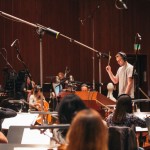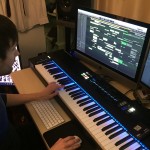Earlier this week we featured Blaine McGurty, the keyboardist, pianist, and arranger for the recently released Retro Remix Revue Volume 1. We’re looking to give you comprehensive coverage of what we feel is one of the best arrangement albums to be released in some time.
This time we’re chatting with Davis Jones, the engineer and co-founder of Retro Remix Revue. We discuss the nuts and bolts of what makes an album sound great, and there’s even some advice in here for you would-be engineers out there. Be sure to stay tuned for our review of Retro Remix Revue Volume 1 later this week to close our Three Days of Retro Remix Revue series.
Have you picked up the album yet? Do you think there’s definitely a benefit to having a dedicated engineer on these kinds of projects?
Read the full interview with Davis Jones after the jump.
OSV: Davis, it’s great to speak with you. We’ve already talked to Blaine McGurty, the projects pianist, keyboardist, and primary arranger. You’re credited as the recording, mixing, and mastering engineer. How did you become involved with this project?
Davis: Blaine is a good friend of mine that I met a few years ago. I have several projects going on in my studio at a given time, so about three years ago, I recorded Blaine’s fusion band when I first met him. Ever since I can remember having my own recording gear, I’ve always had a dream of recording amazing musicians playing some of my favorite video game music. So, shortly after finishing the fusion band’s album, Blaine and I took our mutual affinity towards video game music, and founded Retro Remix Revue together, in order to produce high quality arrangements of these classic songs that everyone can enjoy.
OSV: Tell us a little bit about yourself and your experience in the field of recording and post-production. How did you come to be where you are today?
Davis: Well, my dad works as an engineer/editor, so at an early age, I was exposed to studios, dub stages, recording/mixing/master equipment, etc. I began working for him at the age of 14 which led to many other jobs in the industry. I was able to get a lot of hands-on experience while working alongside some other great engineers, before eventually doing union work. I started off doing a lot of television/music editorial work, then transitioned to doing more recording and mixing related work later on. One show I did a lot of work on was Family Guy, which was a lot of fun, and actually was what helped us track down an amazing trumpet player for our album. After working about 10 years doing this kind of work, I decided I was ready to start producing some of my own projects. I set up a home studio about four years ago, and have been busy recording and producing everything from rock, to jazz, to video game remixes ever since.
OSV: I’ve listened to Retro Remix Revue Volume 1, and I must say it sounds amazing. Tell us some of the tricks you used to get the album to sound so crisp and clear.
Davis: Instead of tricks, I would refer to them as techniques. There are so many things that must be done in order to record and mix an album, it’s hard to know where to start giving tips. Some aspects of the album sound great because I spent a lot of time mixing and tweaking sounds, and certain aspects are due to things like having a fantastic live tracking room to record acoustic instruments in. It always boils down to taking what you have, and using it to the best of your abilities; that’s the key. While I may have some nice gear and a great room, it certainly isn’t the best recording studio out there. I’d say the only “trick” to the whole procedure is simply using all of the techniques and knowledge that I picked up over the years to get the best possible sounding recordings that I can. I know this answer seems rather ambiguous, but there’s so many things to factor in when talking about recording and mixing, I wouldn’t even know where to begin advising.
OSV: Is there anything the rest of us can do when we’re recording to make things easier on ourselves during post-production? Feel free to give us some tips on recording.
Davis: Do everything you can to learn your craft. Don’t settle for turning out the same mixes all of the time; always try to improve on what you do, whether it be by hands-on personal experience, or by reading a book on compression, for example. Also, the better a job you do of recording, the better and easier the post-production will become. If you want to get better at post-production, also get better at live recording. All of these skills are related and so the stronger you are at one thing, the better you will become at the other aspects of recording and mixing. Don’t be afraid to experiment, because if you never try new things, you will never give yourself the opportunity to become a better engineer.
OSV: What are some of the tools you used to create this album? It looks like you have quite an impressive setup in the studio photo on the website. Do you have a favorite software or hardware that you’d like to tell us about?
Davis: For the sake of not boring the majority of people here, I will refrain from naming off all of the equipment and gear that we use in the studio, because there is quite an extensive list. I will say, though, that we record and mix everything in ProTools HD, which is the industry standard. After using ProTools so extensively while working as an engineer in the union, I became very familiar with it, so I would never settle for anything less. It sounds fantastic and is one of the key elements to my setup. I can’t really complain about the hardware situation either; I use a Digidesign Control 24 to mix and track all of our stuff in Pro Tools which is awesome. As for the rest of the studio gear such as microphones, pre-amps, converters, etc., what we have is great, but we are really hoping to be able to upgrade some of the equipment to help our future releases sound even better. I also have an amazing live room. I’m very fortunate to have such a good sounding room acoustically. Since we track all of the acoustic instruments in the live room, you can imagine that the room is going to have a large impact on the overall sound. There are so many different things that contribute to the sound quality and I am lucky to be working with such a solid setup.
OSV: In this age where every kid sitting at their computer is a musician and their own recording, mixing, and mastering engineer, how important is it to have formal training in this area? Is it pretty easy to self-teach if you have the ear for it?
Davis: This is a tough question, because in my case, I would say I’m a little bit of both of these things. I’ve learned a lot over the years working alongside other engineers, and I’ve also learned a lot from just working stuff out on my own. I think someone would be really unwise to rely solely on one or the other. Since I worked in the tv/film industry, I had a lot of hands-on experience with peers of mine that were knowledgeable in all these fields. So I picked up quite a bit from working such a variety of jobs. I will also say that I’ve learned a lot about mixing and recording just by working on this remix album. I wouldn’t say that you necessarily need formal training, but you can bet that it will give you an edge up. You definitely need to be able to teach yourself things as well, though. If you aren’t ready to roll up your sleeves and really dig into this stuff on your own, I recommend looking into doing something else. Finally, finding out if you have “the ear for it,” is kind of like trying to determine whether someone has “what it takes” to paint a picture or to play a musical instrument. It will always be slightly subjective, and it’s going to be different for everyone, so you just have to work hard and develop what you have.
OSV: To give people an idea of how long it takes to do things right, would you be able to estimate how long it took you to mix and master the Retro Remix Revue Volume 1 album in its entirety?
Davis: Since the album was worked on sporadically over the course of a couple of years, it’s hard to give an actual amount of time. The great thing about having a home studio, is that I can go into these sessions whenever I want, and make little adjustments here and there. There were some significant amounts of time that we weren’t working towards the album so it’s really not possible to give an accurate estimate for how long it took to mix the whole thing. Also, the time it takes to mix each track varies because some songs are much more complex than others. All I can say, is that I’ve spent hours upon hours just working and tweaking these tracks to make them sound as best as possible with the equipment I currently have.
OSV: A lot of people out there will often slop something together and not focus much on post-production, hoping that the composition/performance will stand on its own merit. Now, don’t feel that you have to hold back, but tell us how important your job was to making Retro Remix Revue what it is today. How important is this stuff in terms of the final product?
Davis: I will admit, that if the music is really good (emphasis on really) I can still enjoy it if it is sub-par in production quality. However, having a high quality recording just really lets the musical performance shine. Poorly engineered albums are just not acceptable these days, especially on a professional level. Music can always be better appreciated when it is represented in the highest quality possible, and that’s exactly what Retro Remix Revue is all about.
OSV: So you’ve mentioned you’re an avid gamer. What are some of your favorite titles? Is there anything you’d like to see on a Volume 2 in the future?
Davis: Where to begin. I’ve owned pretty much every system under the sun. I’ve played them all. Old school platformers, to real-time strategy, to fighting games, to first-person shooters, there’s really so many games that I like, I don’t really know what to choose as my favorites. I really would like to see some Mega Man, Castelvania, and Kirby among some other franchises that we haven’t yet touched on for future releases. I’m also looking forward to being able to do a remix of “Scrambled Egg Zone,” which is from a Sonic game for the Game Gear. It’s an awesome song; I suggest checking it out.
OSV: Do you have any projects lined up in the future? Feel free to tell us about what you’re working on next so we can look out for your work.
Davis: We are going to start up on Volume 2 shortly, but we’re taking a quick break to finish up some other projects we are working on. Hopefully we will be able to continue making high quality remixes of all these awesome game tunes so all of the listeners can further enjoy this timeless music. Blaine’s fusion project, which I recorded and mixed, should be coming out very soon, and I’m also producing a project with a vocalist that will hopefully be wrapped up very shortly. But rest assured, we will always be working towards more Retro Remix Revue releases. So thank you you to all of you listening and supporting our project. Stay tuned for the next album!









































